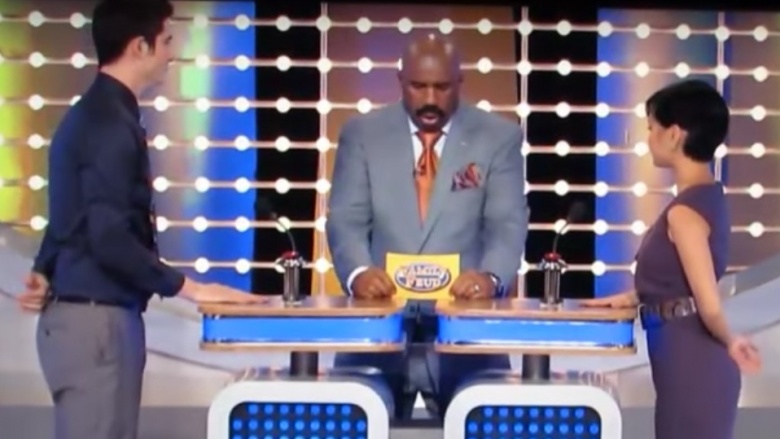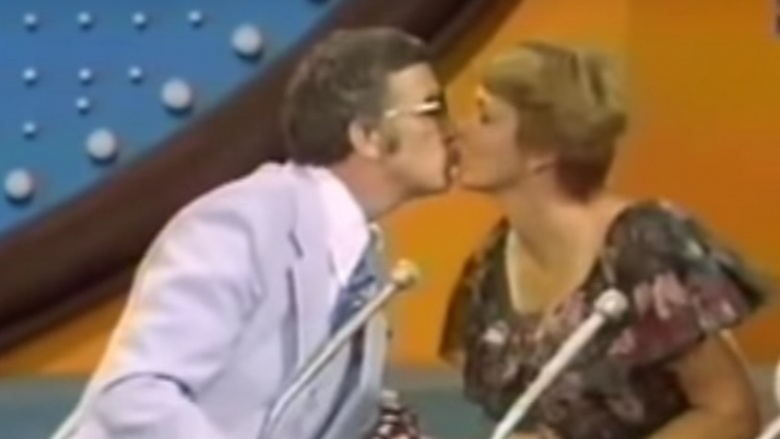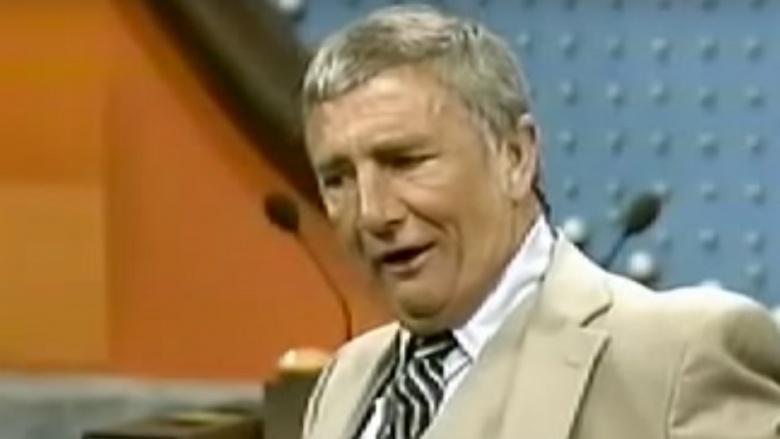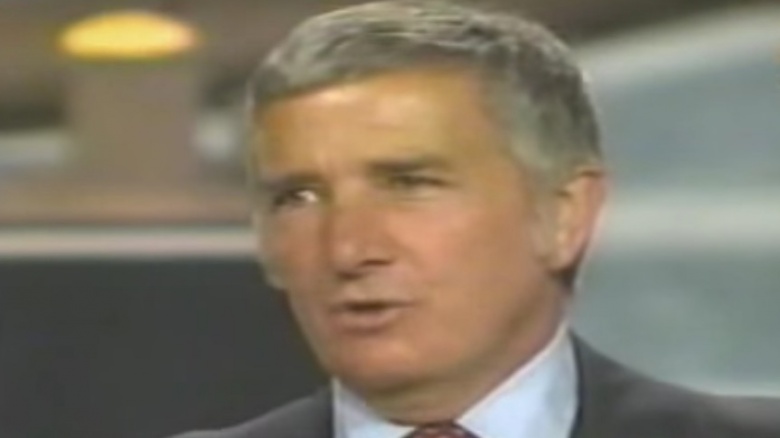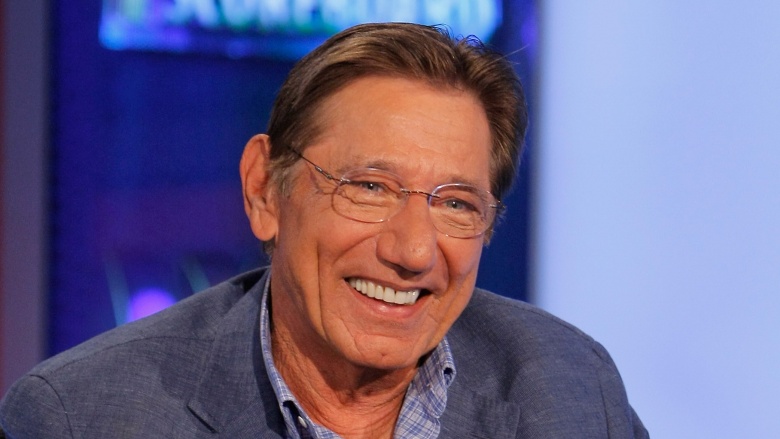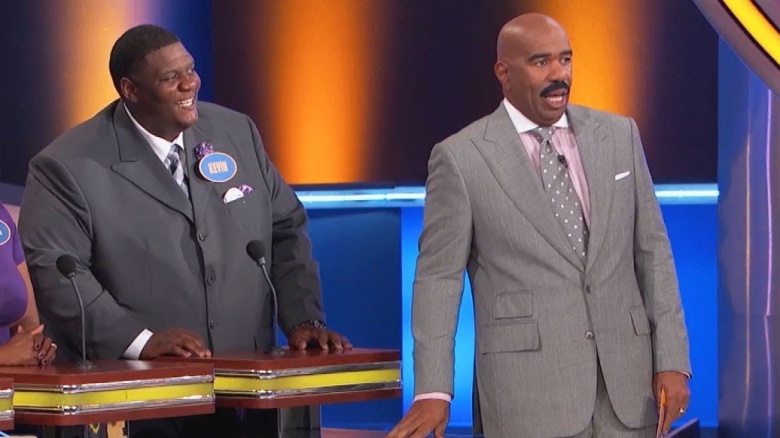The Untold Truth Of Family Feud
Throughout the late '70s and into the early '80s, Family Feud was the most popular game show on TV. The first iteration (and original host Richard Dawson's tenure) ended in 1985, but the show has endured with hosts such as Ray Combs, Louie Anderson, Richard Karn, John O'Hurley, and Steve Harvey. See how much you know about the Feud.
What it's like to be a contestant
According to people who've been a contestant on the most recent iteration of Family Feud, it's a well-oiled, highly efficient TV production. Like many other game shows, it films four to six episodes a day, almost in real time. (Host Steve Harvey's joking around adds some time to the tapings.)
Contestants are treated well and are kept well-fed with a continental breakfast in the morning, Subway subs for lunch, and a granola bar in the afternoon. As far as the paperwork side of things goes, contestants do have to prove they're a family. Whatever money is won is sent 90 days after taping occurs, and is automatically split five ways and sent as five separate, even checks to each contestant.
Why Richard Dawson kissed all the female contestants
Every game show host has a signature. For Bob Barker on The Price is Right, it was that skinny microphone. For Alex Trebek on Jeopardy!, it was his iconic mustache. For Richard Dawson on Family Feud, it was kissing nearly every female contestant, either on the mouth or on the cheek. Dawson started doing it in one of the first weeks the show started taping in 1976 to help soothe a nervous contestant. "Here was the rather darling lady about 50 or so and she was so nervous, she was a basket case," he explained. "She didn't want to let her family down but she had no idea at all what to say." And so he did what he said his "mom would do to me whenever I had a problem of any kind. I kissed her on the cheek, and I said, 'that's for luck.' " The woman provided an answer, her family went on to win the game, and kissing became a Dawson tradition.
Executives, however, found it unseemly and tried to get him to stop. According to Dawson's goodbye speech in his final episode of Feud in 1985, they'd apparently received a handful of especially pointed complaints from people who didn't like him kissing women of color. So Dawson asked Feud viewers to write to say if they thought he should drop the smooching. A few hundred wanted him to stop—thousands told him they loved it. However, when Dawson returned to host Family Feud in the 1990s, there was no more kissing of the female contestants. He'd made a promise to his young daughter that he wouldn't kiss anyone other than her mother.
The host's jokes upset an advertiser
During Family Feud's original mid-'70s heyday, America was still smarting from the Watergate scandal that drove President Richard Nixon out of office. Richard Dawson loved to make fun of Nixon, and did it on the show all the time. This reportedly so angered a prominent Family Feud sponsor that a representative from the company complained to ABC (which ran the daytime version of Feud at the time), who complained to producers and told them to tell Dawson to stop it.
Feud producer Howard Felsher passed along the note to Dawson, but Dawson refused to take heed. On the air, Dawson directly addressed the controversy and politely told the advertiser that if they didn't like his jokes, they could pull their ads, because the show was so popular there were plenty of companies quite eager to take their place. ABC brass demanded the Feud episode air with Dawson's remarks cut. When Dawson threatened to quit, the episode aired unedited and Dawson stayed put.
Richard Dawson was a bit of a prima donna
Family Feud was Dawson's show, and he knew it. He apparently had a tendency to make life hellish for almost anyone on set. He'd get riled up about broken lightbulbs or a malfunctioning microphone, for example. He'd add cost and time to the show's production by telling long stories and jokes during taping that would make the show five minutes too long, requiring extra editing. His relationship with producer Howard Felsher was so acrimonious that Dawson tried to ban Felsher from the set.
Production company boss Mark Goodson had to keep both men happy, so he heeded Dawson's ban, but also made Felsher an executive producer on the show—giving him authority without the need to be on set. Goodson allowed Dawson to install a new day-to-day producer: his daughter-in-law, Cathy.
Richard Dawson married a contestant
In May 1981, the Johnson family competed on a string of Family Feud episodes. Dawson took a shine to one of the family's 20-something daughters, Gretchen. They flirted throughout their few episodes, but after they finally lost, Dawson asked Johnson if if would be okay if he could call her, and she granted him permission to get her number from her application paperwork.
Dawson called her three days in a row and didn't get an answer, so he thought she'd passed along a fake number. As it turns out, she'd had her wisdom teeth extracted and was out of commission. After she recovered, Dawson invited her to drive up from her home in San Diego to Los Angeles so he could cook her dinner. He made her beef Wellington, and she must have liked it: they were married within a few years.
Some famous people almost hosted
When the show was revived for syndication, lingering and mutual resentment between producers and Richard Dawson meant that a new host had to be sought out. Mark Goodson held some meetings and auditions, ultimately hiring charismatic ex-NFL quarterback Joe Namath. He shot a few test shows ... but then Goodson had second thoughts and nixed Namath, instead hiring Ray Combs, a little-known L.A. stand-up comedian who was warming up the studio audiences of sitcoms such as The Golden Girls and Amen.
Combs hosted the show for six years, after which Family Feud was revived again when the rights were sold to the Pearson TV production company in 1997. Comedian Louie Anderson wound up with the gig, but he was only considered after the producers' first choice, beloved singer and actress Dolly Parton, turned them down.
A Richard Dawson comeback totally tanked
After six years with Combs at the helm, viewership for Feud had dropped hard, and producers needed to make a big change. They swallowed their pride and did what they couldn't bear to do the last time they'd revived the show: they asked Richard Dawson to come back.
Dawson's old sparring partner Howard Felsher had been a producer during the Combs era, and left when Dawson returned—but he stayed with the show in its transition and helped get him back. He claimed that Dawson was so anxious to return to TV that he promised to lose the 50 pounds he'd gained in retirement by the time episodes started taping again in mid-1994. Dawson didn't lose the weight, but he didn't need to—producers had sold the show to more than 100 TV stations based entirely on the idea that he'd be a part of it. The comeback was not meant to be, however: the second Dawson era only lasted for the 1994-95 season.
The tragic decline of Ray Combs
According to the surprisingly salacious E! True Hollywood Story episode about Family Feud, the task of firing Combs fell to Jonathan Goodson, the new chairman of Goodson Television Productions following the death of his father. Combs was told his contract would not be renewed before he was done shooting episodes for the season. Like a pro, he finished them out. Not so professional, however, was how Combs handled himself on air during the taping of his last episode.
After a contestant in the final round got straight zeroes with his lackluster responses, Combs darkly quipped, "You know, I've done this show for six years and this could be the first time that I ever had a person who actually got no points, and I think it's a damn fine way to go out. Thought I was a loser until you walked up here, and you made me feel like a man." Combs waved goodbye to viewers and instead of hanging around chatting with players as the credits rolled, walked right off the set and out of the studio.
Combs' termination set off a two-year downward spiral. He tried to host a new game show called The Love Psychic, but it flopped. He closed two Cincinnati comedy clubs he owned due to financial problems, and he and his wife filed for divorce. In June 1996, he reportedly told a friend he was so mad at his wife that he was going to "hurt her and destroy" their house. The friend called police, who found Combs at his ransacked home, bleeding profusely from his head, which he'd been repeatedly banging against the wall. He was admitted to Glendale Adventist Medical Center on a 72-hour mental evaluation hold. A day later, staff discovered Combs in his room, having taken his own life at the young age of 40.
It's back on top of the ratings again
Family Feud was canceled in 1985 due to declining ratings. After a nine-year run, it was displaced as the most popular game show in syndicated TV by Wheel of Fortune and the revival of Jeopardy!, both of which started outdrawing Feud in 1984. For the next 30 years, Wheel and Jeopardy! almost always sat atop the TV ratings, an amazingly long-lasting chokehold on the ratings. But the addition of comedian and talk show veteran Steve Harvey as host in 2010 returned Feud to a place of popularity not seen since the Dawson era, when it was the No. 1 show on daytime TV. It's now the No. 1 game show again. In fact, in October 2016 it marked its 26th straight week as the most-watched game show—that's six straight months of beating Jeopardy! and Wheel of Fortune.

